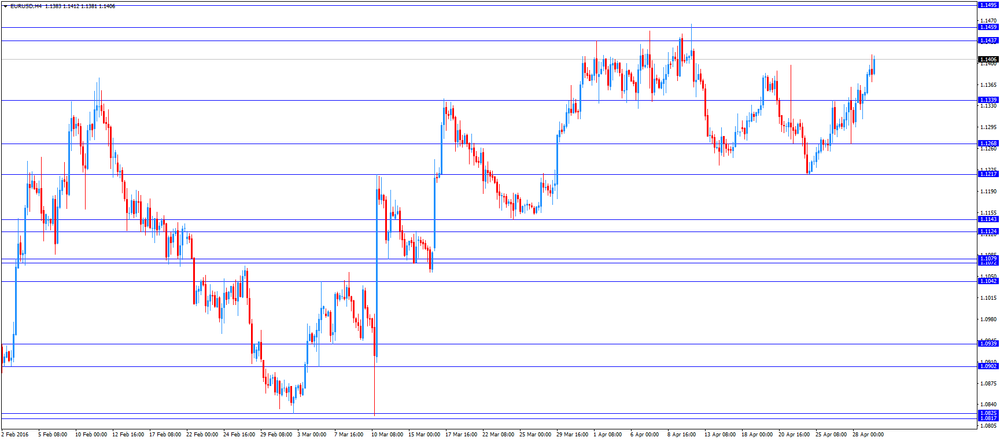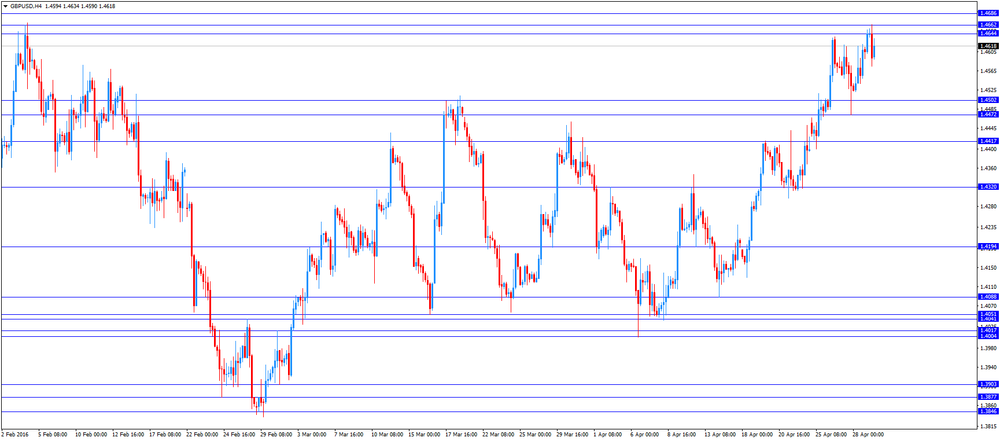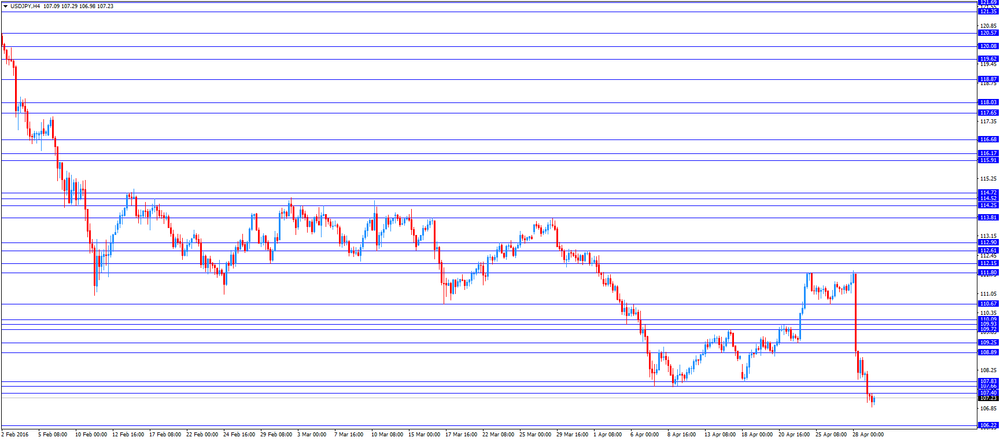- Analytics
- News and Tools
- Market News
- Foreign exchange market. European session: the euro traded mixed against the U.S. dollar after the release of the mixed economic data from the Eurozone
Foreign exchange market. European session: the euro traded mixed against the U.S. dollar after the release of the mixed economic data from the Eurozone
Economic calendar (GMT0):
(Time/ Region/ Event/ Period/ Previous/ Forecast/ Actual)
01:00 New Zealand ANZ Business Confidence April 3.2 6.2
01:30 Australia Producer price index, q / q Quarter I 0.3% 0.2% -0.2%
01:30 Australia Producer price index, y/y Quarter I 1.9% 1.2%
01:30 Australia Private Sector Credit, m/m March 0.6% 0.6% 0.4%
01:30 Australia Private Sector Credit, y/y March 6.6% 6.4%
02:30 Australia RBA Assist Gov Debelle Speaks
06:00 Germany Retail sales, real adjusted March -0.4% 0.3% -1.1%
06:00 Germany Retail sales, real unadjusted, y/y March 5.5% Revised From 5.4% 2.2% 0.7%
07:00 Switzerland KOF Leading Indicator April 102.8 Revised From 102.5 102.8 102.7
08:00 Switzerland SNB Chairman Jordan Speaks
08:30 United Kingdom Mortgage Approvals March 73.19 Revised From 73.87 74.5 71.36
08:30 United Kingdom Consumer credit, mln March 1392 Revised From 1287 1300 1883
08:30 United Kingdom Net Lending to Individuals, bln March 4.9 9.3
09:00 Eurozone Harmonized CPI ex EFAT, Y/Y (Preliminary) April 1% 0.9% 0.8%
09:00 Eurozone Harmonized CPI, Y/Y (Preliminary) April 0.0% -0.1% -0.2%
09:00 Eurozone Unemployment Rate March 10.4% Revised From 10.3% 10.3% 10.2%
12:00 United Kingdom BOE Deputy Governor for Financial Stability Jon Cunliffe speaks
The U.S. dollar traded mixed against the most major currencies ahead of the release of the U.S. economic later in the day. The personal consumer expenditures (PCE) price index excluding food and energy is expected to increase 0.1% in March, after a 0.1% rise in February.
Personal income in the U.S. is expected to rise 0.3% in March, after a 0.2% gain in February.
Personal spending in the U.S. is expected to gain 0.2% in March, after a 0.1% increase in February.
The Chicago purchasing managers' index is expected to decrease to 53.0 in April from 53.6 in March.
The euro traded mixed against the U.S. dollar after the release of the mixed economic data from the Eurozone. Eurostat released its consumer price inflation data for the Eurozone on Friday. The preliminary consumer price inflation in the Eurozone declined to -0.2% year-on-year in April from 0.0 % in March, missing expectations for a fall to -0.1%.
The preliminary consumer price inflation excluding food, energy, alcohol, and tobacco fell to an annual rate of 0.8% in April from 1.0% in March. Analysts had expected the index to decrease to 0.9%.
Food, alcohol and tobacco prices were up 0.8% in April, non-energy industrial goods prices gained 0.5%, and services prices climbed 1.0%, while energy prices dropped 8.6%.
Eurozone's preliminary flash gross domestic product (GDP) increased by 0.6% in the first quarter, after a 0.3% gain in the fourth quarter.
On a yearly basis, Eurozone's preliminary GDP rose by 1.6% in the first quarter, after a 1.6% gain in the fourth quarter
Eurozone's unemployment rate declined to 10.2% in March from 10.4% in February, beating expectations for a fall to 10.3%. It was the lowest reading since August 2011. February's figure was revised up from 10.3%. The lowest unemployment rate in the Eurozone in March was recorded in Germany (4.2%) and the highest in Greece (24.4% in January 2016) and Spain (20.4%).
The British pound traded lower against the U.S. dollar. The Bank of England (BoE) released its number of mortgages approvals for the U.K. on Friday. The number of mortgages approvals in the U.K. was down to 71,357 in March from 73,195 in February, missing expectations for a decrease to 74,500. February's figure was revised down from 73,871.
Consumer credit in the U.K. rose by £1.883 billion in March, exceeding expectations for an £1.300 billion increase, after a £1.392 billion gain in February. February's figure was revised up from £1.287 billion.
Net lending to individuals in the U.K. increased by £9.3 billion in March, after a £5.0 billion gain in February. February's figure was revised up from a £4.9 rise.
The Canadian dollar traded mixed against the U.S. dollar ahead of the release of the Canadian GDP data. Canada's GDP growth is expected to decline 0.1% in February, after a 0.6% gain in January.
The Industrial Product Price Index (IPPI) is expected to rise 0.1% in March, after a 1.1% drop in February.
The Swiss franc traded mixed against the U.S. dollar. The Swiss National Bank (SNB) Chairman Thomas Jordan said in a speech on Friday that inflation in Switzerland remained negative, driven by a stronger Swiss franc and a decline in oil prices. He added that inflation was expected to be positive in 2017.
The Swiss Economic Institute KOF released its leading indicator for Switzerland on Friday. The KOF leading indicator fell to 102.7 in April from 102.8 in March. March's figure was revised up from 102.5. Analysts had expected the index to remain unchanged at 102.8. The decline was mainly driven by negative signals from the financial sector, the exporting industries and construction.
EUR/USD: the currency pair traded mixed
GBP/USD: the currency pair declined to $1.4575
USD/JPY: the currency pair traded mixed
The most important news that are expected (GMT0):
12:30 Canada GDP (m/m) February 0.6% -0.1%
12:30 U.S. Personal Income, m/m March 0.2% 0.3%
12:30 U.S. Personal spending March 0.1% 0.2%
12:30 U.S. PCE price index ex food, energy, Y/Y March 1.7%
12:30 U.S. PCE price index ex food, energy, m/m March 0.1% 0.1%
13:45 U.S. Chicago Purchasing Managers' Index April 53.6 53
14:00 U.S. Reuters/Michigan Consumer Sentiment Index (Finally) April 91 90
© 2000-2026. All rights reserved.
This site is managed by Teletrade D.J. LLC 2351 LLC 2022 (Euro House, Richmond Hill Road, Kingstown, VC0100, St. Vincent and the Grenadines).
The information on this website is for informational purposes only and does not constitute any investment advice.
The company does not serve or provide services to customers who are residents of the US, Canada, Iran, The Democratic People's Republic of Korea, Yemen and FATF blacklisted countries.
Making transactions on financial markets with marginal financial instruments opens up wide possibilities and allows investors who are willing to take risks to earn high profits, carrying a potentially high risk of losses at the same time. Therefore you should responsibly approach the issue of choosing the appropriate investment strategy, taking the available resources into account, before starting trading.
Use of the information: full or partial use of materials from this website must always be referenced to TeleTrade as the source of information. Use of the materials on the Internet must be accompanied by a hyperlink to teletrade.org. Automatic import of materials and information from this website is prohibited.
Please contact our PR department if you have any questions or need assistance at pr@teletrade.global.


















